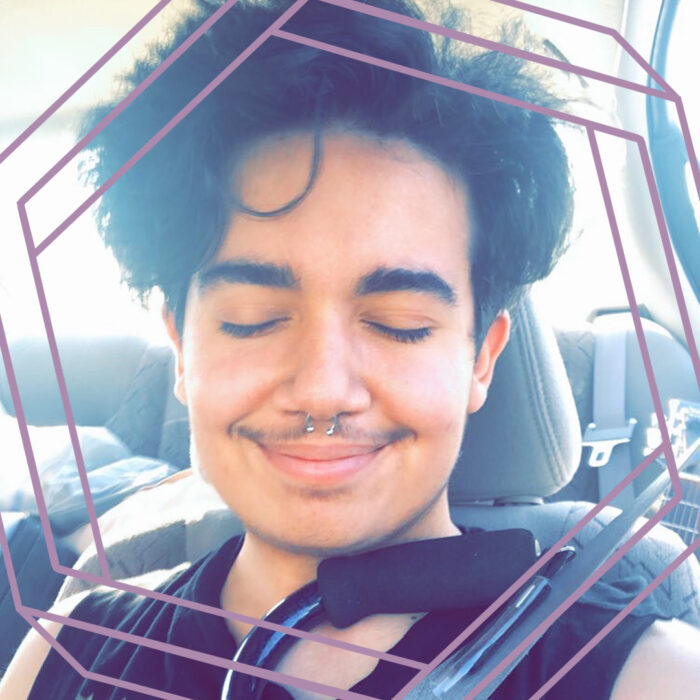77 – Kayle
Description
 </figure>
</figure>Kayle Hill talks arthritis, medical trauma, and hypermobility.
Transcript
Brianne: I’m Brianne Benness, and this is No End In Sight, a podcast about life with chronic illness.
[guitar riff]
Drew: Hey, this is associate producer Drew Maar. Before we get started, here’s a quick reminder that you can find No End In Sight on patreon, which is a really simple way for listeners to subscribe to support the show financially on a monthly basis. So if you’ve been enjoying the podcast and you also have a couple bucks to spare, We’d be so so grateful if you’d sign up as a patron at patreon.com/noendinsight.
Today we’ll be talking to Kayle Hill about rheumatoid arthritis, medical trauma, and hypermobility.
A couple of content notes for this episode: medical trauma and PTSD are major themes and a lawsuit is discussed starting around 55 minutes in.
Before we start, here’s our disclaimer: This podcast is not intended as a substitute for professional medical advice, diagnosis or treatment. Make sure you talk to your practitioner about any questions or symptoms.
[guitar riff]
Brianne: Okay. Well, I like to start just by asking people, how has your health as a kid?
Kayle: Not good. It was never good. As early as I can remember, I’ve always had a chronic illness. My relationship to it has definitely changed over time because I’ve acquired more and more and more chronic illnesses, but yeah. It was never really that great, especially because my major disease back then was rheumatoid arthritis, and I was on methotrexate, which is a chemotherapy drug, and I was just so sick all the time.
Brianne: How was that diagnosed? Like, how did you end up getting diagnosed with juvenile RA basically, right?
Kayle: Yeah. So, I know this only from the stories that my mom has told me, but basically, it was my left ankle to begin with. And it was just red and swollen. And she’s a nurse, so even as I was growing up, she was always like, “Okay, let’s just wait. Let’s not freak out and go to the doctor.”
She thought maybe I sprained it. I don’t know how. I was a baby. I was delayed in walking, and eventually it got to the point where even when she would try to put my socks on, I would just scream.
Brianne: Presumably from pain, I get that it’s anecdotal. Yeah.
Kayle: And so she took me to the pediatrician. And he took some images, and he was like, “This is not good.”
Brianne: “There is damage.”
Kayle: Yeah. “There’s damage, and it’s not the kind of damage that can heal.” So I was brought over to Boston children’s hospital, and there’s a whole side story about the first rheumatologist we saw who was apparently absolutely terrible. But then the head of the rheumatology department… my case kind of got pushed up to him, and I was with him until I was 18.
Brianne: Yeah.
Kayle: From like, one year old to 18 years old.
Brianne: So like, as long as you can remember, basically.
Kayle: Yeah, yeah. He was like, the doctor. We practically worshiped him growing up because he would just… you know, he was more of a primary care doctor to me than my own primary care was, but also my feelings about him have changed over the years as well.
Brianne: I believe that that could happen. Okay. So yeah, it was always kind of a part of it, and you’d been in treatment this whole time, as you said. So with methotrexate, which is obviously not a gentle medication, as far as these things go, but if you’ve always been on it, you’ve probably always kind of been aware of the trade-off. Do you feel like that was something that you thought about at all? Like, what was medication side effect versus what was symptom, I guess.
Kayle: Yeah. Yes. Sort of.
Brianne: Yeah, it would be different. I would think
Kayle: Yeah. And it’s something that I’ve almost had to figure out in therapy a little bit because I just… growing up I always had chronic pain, but the severe nausea and just feeling lethargic all the time. And you know, I really couldn’t keep any food down. I couldn’t go play outside with my friends. My immune system was next to nothing, so I would… I was in the hospital when I was very little for like, severe bronchitis, all that jazz. And I always thought… cause I just self analyze a lot, so even thinking back like, I definitely… in therapy right now, we’re working on like, trust issues with my parents giving me this medicine as a child. And even though I know logically, it was the thing that they had to do, it still felt like a betrayal because I definitely associated all of my negative symptoms with that injection.
Brianne: Right. And of course, I’m sure as a physical experience that it felt that way because that was the cycle. Yeah. I feel like something that’s so present for me, and has been for a long time, is this thing of like, they just didn’t have the same information that we have now. And that’s… there are so many complicated feelings in that. I feel like I’m now having this conversation more with people, especially as it relates to, spoiler alert, hypermobility that like, the people who, if they had known might’ve made different decisions, often just didn’t know. And I think that kind of translates to so many healthcare decisions that our parents have to make where it’s like, “Well, do I think they were acting in good faith? Yes, I do. Does that impact how hard it was to live through it? No, not really.” Like, it’s a lot to hold
Kayle: Yeah. Yeah, definitely those feelings got a lot more intense with my surgery. Yeah.
Brianne: Okay. So that was kind of the status quo for quite a while, was all the things that you’re describing, both the actual chronic pain and then the medication and the side effects and the medication and the complicated interplay of those experiences. And so, at some point something happened and did something happen suddenly or gradually would you say now?
Kayle: Physiologically gradually, but in my life, suddenly.
Brianne: Right. Yeah. It’s interesting how often that happens.
Kayle: Yeah. Yeah, I do want to back up for one second, cause I want to preface… later on I’m sure I’ll talk about POTS. When I was like seven years old, I had an incident where my heart rate shot up for no reason, had to see a cardiologist, he was like, “Pfft, I don’t know what’s wrong with you.” And that was just like, another thing that my parents were like, “This is odd.”
Brianne: Like a blip.
Kayle: It was a blip, yeah. But then, fast forward a few more years. I was 12, and I failed my scoliosis screening at school, and they were like, “You know, it looks really mild. It’s probably not a big deal, but you should go get x-rays to check it out.” And I did at my primary care, and when she came back, she looked horrified.
Brianne: Always what you’re hoping for.
Kayle: Yeah. It was a lot worse than anybody had anticipated two major, major curves, and they compensated for each other. So for the most part, I looked straight. I didn’t bend. I actually bend more to one side now after my surgery than I did before cause they could only fix one of the curves. But yeah, I had zero pain in my back. I had the joint pain still, but I had zero back pain and zero symptoms of scoliosis, and they were like, “It’s really, really bad. Like, you have to get a back brace or surgery, like now.”
Brianne: Yeah.
Kayle: So.
Brianne: Something that is so loud about that now… about just being told something like that, is like, I feel like if I didn’t know anything about chronic illness, so like… I don’t know, five years ago for me, if someone was like, “Hey, we found out this structural thing about your body. It causes a ton of pain. If you’re not in that much pain right now, then you’re lucky because if we intervene, we can prevent it from escalating to the point that it will get to.” But like, that entire logical premise is faulty since it didn’t check in with how… like, it didn’t confirm that your experience aligned with that interpretation. Did that make sense? It happens with other stuff too. Like, it’s a pattern.
Kayle: Yeah. Yeah. It was definitely… that whole experience is where my PTSD diagnosis comes into play, and a lot of it is from feeling that lack of control of my own fate, especially because it went so horribly wrong.
Brianne: As we will get to.
Kayle: Yeah. And you know, my mom still holds a lot of guilt about it. She… of course, she didn’t do anything, but of course, with hindsight, she’s like, “But If I knew, I could have done list, I could have done that.”
Brianne:</st







